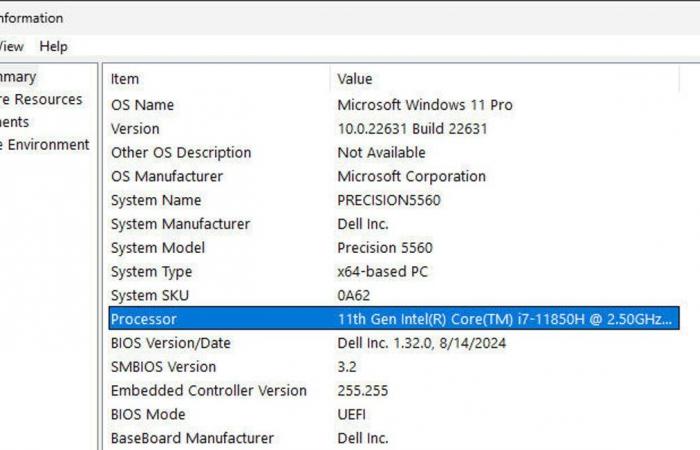When October 2025 approaches, your old Windows 10 computer, although still functional, will no longer receive monthly security updates. Although you have several options, the simplest solution is to upgrade this computer to Windows 11.
If you can.
Microsoft is currently engaging in serious age discrimination against your Windows PCs. Even the oldest PCs can run Windows 10. But not everyone can upgrade to the latest version.
There are more than a billion Windows PCs in the world today, most of them running Windows 10 (6 million in France). So will your PC last another decade? Or should we find him a retirement home? You can already ask a simple question: How old is this PC exactly?
The date of purchase is not as important as the date the PC and its internal components were designed. And the most important of these components is the processor. In Windows 10, you can find out this detail by running the System Information utility, Msinfo32.exe. On the System Summary page, look for the value Processor, as in the example below.
The System Information utility will tell you the CPU of your old PC. Screenshot by Ed Bott/ZDNET
Armed with this information, you can classify your PC into one of the following four categories. Here’s how to know which category you’re in.
Modern PCs: 2019 or newer
PCs designed and built in 2019 or later can run Windows 11 with full support. Your machine is in this category if its processor is in one of the following lists
By design, every machine that includes one of the processors on this list will also include the other essential component required by Windows 11: a Trusted Platform Module (TPM) version 2.0.
If your PC is in this group, you can upgrade it to Windows 11 using Windows Update or the Windows 11 Setup Assistant. And it should be able to run smoothly for another decade.
If your CPU isn’t on any of these lists, you’ll need to dig a little deeper. You can get important clues about a processor’s age and capabilities by going to Intel’s processor specifications page or AMD’s processor specifications page and searching for the part name ( i7-11850H, for example).
Designed for Windows 10: 2016-2019
It seems unfair to call these PCs old. They are middle-aged at best and capable of performing just about any modern task.
Any system built to meet Windows Hardware Compatibility Program specifications during this period includes a TPM 2.0, although the processor is almost certainly not on the list of parts supported by Windows 11. If you have the one of these PCs, you can use Microsoft’s procedure to upgrade to Windows 11 by making a simple registry edit.
These PCs are likely to run well under Windows 11, and even the oldest of them should be useful for at least five more years.
Designed for Windows 7/8: 2010-2015
These machines are starting to age and can be considered seniors.
But just like humans, you can’t judge their abilities based on their age alone. Some, especially those that were originally designed as high-end business PCs, can still deliver excellent performance. Others deserve to be retired.
To be sure, you have to look closely at what they contain and answer two questions:
Is there a TPM?
Many, but not all, PCs from this era include a Trusted Platform Module (TPM).
And even a TPM1.2 is enough for Microsoft’s update solution to be accepted.
Who made the CPU?
Almost all Intel processors from this era can meet the new, more stringent hardware requirements for Windows 11, version 24H2. Which means you can probably use the “official” workaround with these PCs.
On the other hand, if your computer is equipped with an AMD processor, prepare to be disappointed. AMD only started fully supporting SSE3.2 and PopCnt instructions around 2013, and I’ve heard of many owners of PCs with AMD processors from that era who can’t upgrade to Windows 11.
Even on a machine without a TPM, you can use a utility like Rufus to bypass compatibility blocks. But these computers are probably on borrowed time.
From the Dark Ages of the Windows PC: 2009 and Before
At that time, Windows Vista was the target of all the “Get a Mac” ads and Windows XP was dominant.
If you’re considering upgrading one of these old hands, don’t get your hopes up.
You might come across a high-end PC from this era that barely passes, but that’s the exception and not the rule. Your old PC from that era may still be capable of some feats, but it’s unlikely it will do so with Windows 11.
If you can’t bear to put your old workhorse aside, you’ll need to find a new operating system. Linux?







